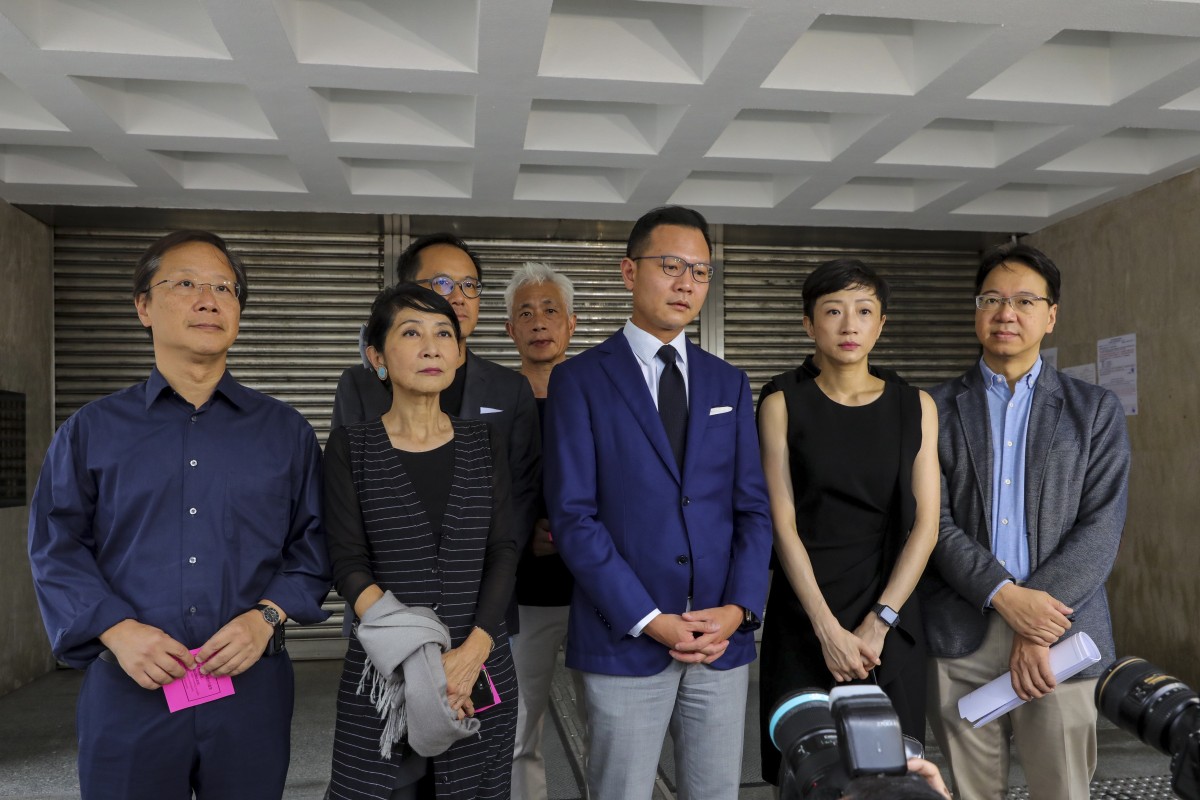
Hong Kong protests: Court rejects second attempt to overturn mask ban, but calls for urgent hearing into opposition lawmakers' judicial challenge
Pro-democracy legislators are calling the legal action 'the last battle between authoritarianism and the rule of law'
 Pro-democracy lawmakers (from left to right) Dr Kwok Ka-ki, Claudia Mo, Kenneth Leung, Leung Yiu-chung, Dennis Kwok, Tanya Chan, and Charles Peter Mok, filed an urgent application for a temporary suspension on the anti-mask law.
Pro-democracy lawmakers (from left to right) Dr Kwok Ka-ki, Claudia Mo, Kenneth Leung, Leung Yiu-chung, Dennis Kwok, Tanya Chan, and Charles Peter Mok, filed an urgent application for a temporary suspension on the anti-mask law.A court in Hong Kong has rejected a second attempt to suspend the mask ban, but called for an urgent hearing as 24 opposition lawmakers filed a legal action they dubbed “the last battle between authoritarianism and the rule of law”.
High Court judge Mr Justice Godfrey Lam Wan-ho refused a temporary injunction of the Prohibition on Face Covering Regulation, enacted through the city’s emergency law on Saturday. The judge will give his reasons on Tuesday.
Carrie Lam issues new law banning masks, but protesters vow to defy ban
But Lam said the judicial challenge filed by the lawmakers must be heard by the end of October, an accelerated process the legislators called “a rare move”. The government had initially suggested the hearing take place a year from now.
“Obviously the court also sees that this case raises extremely important constitutional issues,” said Dennis Kwok Wing-hang, a lawmaker for the legal functional constituency who led the judicial challenge.
The lawmakers took the government to court on Sunday morning, arguing that the chief executive’s move was unconstitutional.
They accused her of bypassing the legislature when she imposed the ban on wearing masks at public assemblies through a colonial law that preceded the city’s constitution and human rights law.
The move “subverts the constitutional order”, their barrister Gladys Li SC said in court.
Defying mask ban, tens of thousands of Hongkongers protest over the weekened
Li argued the Emergency Regulations Ordinance (ERO), passed in 1922, gave the city’s leader “overwhelming power”. But since then, the city’s mini-constitution Basic Law and Bill of Rights came in to place.
She said the Basic Law clearly stated Legco was responsible for making law, not the government as the executive branch. The court in Hong Kong had established the principle of separation of power over the years, she added.
Li warned one consequence of Lam’s sweeping power under the ERO was that it allowed the chief executive to enact the extradition bill – the controversial legislation that sparked months of anti-government protests – any time she wished.
She also hit back at the government’s claim the ban could be reviewed when Legco reconvened in mid-October.
The ERO stated only the chief executive had the power to repeal the regulation now it had been introduced, Li said.
Barrister Benjamin Yu SC, for the government, disagreed, saying the ERO aimed to delegate lawmaking power to the head of Hong Kong on various occasions.
Teen shot by police on National Day charged with rioting and assault
Yu said Li’s argument overlooked “the rioting, arson, mayhem, destruction, the people’s fears and the terror”, all of which showed Hong Kong was in a situation so dire and severe that society needed protection.
Yu rebutted Li’s claims that the chief executive should have run the ban past the legislature, arguing that the government would have faced resistance from pro-democracy lawmakers who should have been telling citizens to stop wearing masks in the first place.
It was the second High Court attempt to suspend the law since the government announced the ban on Friday. Both were rejected.
Two activists, including ousted lawmaker “Long Hair” Leung Kwok-hung, failed with the first attempt which was made hours before the restriction came into force at 12.01am on Saturday.
